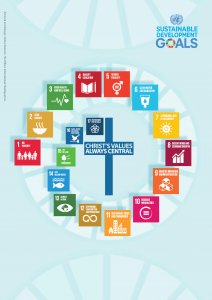A recent survey by seven Anglican agencies has gathered Anglican views on the United Nation’s (UN) Sustainable Development Goals to prompt discussion and encourage churches to take action toward achieving the 17 goals.
The survey was led by USPG, in collaboration with the Anglican Alliance, Anglican Board of Mission, Episcopal Relief & Development, Mothers’ Union, and The Primate’s World Relief and Development Fund. It explored how local churches worldwide could best be represented in collaborative efforts by the global faith community to achieve the UN’s Sustainable Development Goals.
The Sustainable Development Goals (SDGs) were adopted by the UN in 2015 as a new global development agenda to follow on from the Millennium Development Goals (MDGs). The 17 goals include targets to encourage progress toward things like zero hunger, quality education, gender equality and clean energy.
Faith communities have been recognised as crucial in the efforts towards achieving these goals. In his opening speech at the UN’s 2016 Berlin conference, titled ‘Partners for Change: Religions and the 2030 Agenda’, Dr Gerd Müller, Germany’s Federal Minister for Economic Co-operation and Development, said, “We will only be able to implement this pact on the world’s future, known as the 2030 Agenda, in co-operation with the religious faiths.”
An International Partnership on Religion and Sustainable Development has been established to bring together governmental and inter-governmental organisations with religious and value-driven organisations. It aims to harness the positive impact of religion and recognise the prominent role faith communities play in sustainable development, for example in providing essential services in healthcare and education, as well as supporting victims of natural and man-made disasters.
Members of the Anglican Communion are being encouraged to engage with this initiative to ensure that they are able to influence the international agenda and collaborate with wider faith and development communities in delivering on the SDGs.
The survey gained an understanding of the Anglican Church’s current engagement with the goals, and the ways in which the local church is reaching out into its community to promote sustainable development.
Revd Rachel Carnegie, Co-Executive Director of the Anglican Alliance, said, “In undertaking this survey, USPG have made a great contribution to our understanding of how the Communion is engaging with the UN Sustainable Development Goals. The results show that the churches’ practical activity to promote human flourishing in harmony with creation is integral to our shared understanding of God’s holistic mission in the world. The SDGs can be mapped across the Anglican Marks of Mission, contributing to how the Communion serves to bring God’s good news to the world. At the Primates’ request, the Anglican Alliance is currently working on Bible studies and theological reflections on the SDGs and the Marks of Mission. These resources and reflections will be drawn from across the Communion and will be available in mid-2018.”

Some of the feedback from participants highlighted the unique ways in which the Church contributes to sustainable development and humanitarian assistance. One participant said, “Churches are often found in the most remote and difficult places where governments can’t or won’t go.” Another said that the Church was significant in “motivating others, gathering people together in support and solidarity, organising and hosting events and consciousness raising; challenging communities through word and deed.”
Participants were also asked how they could be better supported in their work towards achieving the SDGs, and how they could be helped to work more in collaboration with international agencies such as the UN to reach the goals.
Responses included calls for better communication and relationship building, to help international agencies understand the everyday lives of the communities that the Church is working with, as well as “faith literacy, capacity and trust”.
Recommendations from the results of survey include a shadowing programme, where a member of the local faith community and a member of the relevant local UN office would shadow each other to facilitate an understanding of each other’s work, develop relationships and aid literacy on both sides.
Emma Bridger, Programme Monitoring and Evaluation Manager at USPG, who coordinated the survey, said, “We are so grateful to everyone who took the time to complete the survey. It was a huge privilege to be able to bring together and present such a wealth of knowledge and experience showing how Anglican Churches worldwide are contributing to all 17 goals.
“The suggestions provided regarding how we can continue to further strengthen the relationships and partnerships necessary to achieve these global goals were particularly insightful and helped shape the discussion at PaRD. We very much look forward to working with the Anglican Communion and PaRD as we take some of these ideas forwards over the next 6 months.”
A final report on the outcomes of the survey stated:
“Every community represented articulates a clear link between the SDGs and the teachings of the Bible. The work of these communities did not start with the SDGs and will not finish with them. What the SDGs have done however is drawn into focus the fact that there is a common project with common goals towards which communities around the world are working and accountable.”
In the photo: A poster depicting the SDGs with the cross at the centre © The Salvation Army

